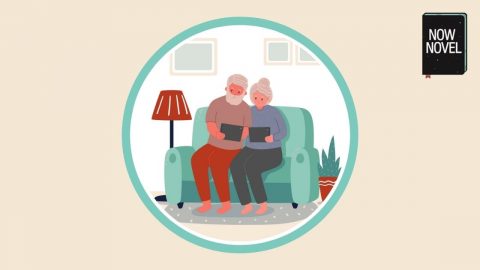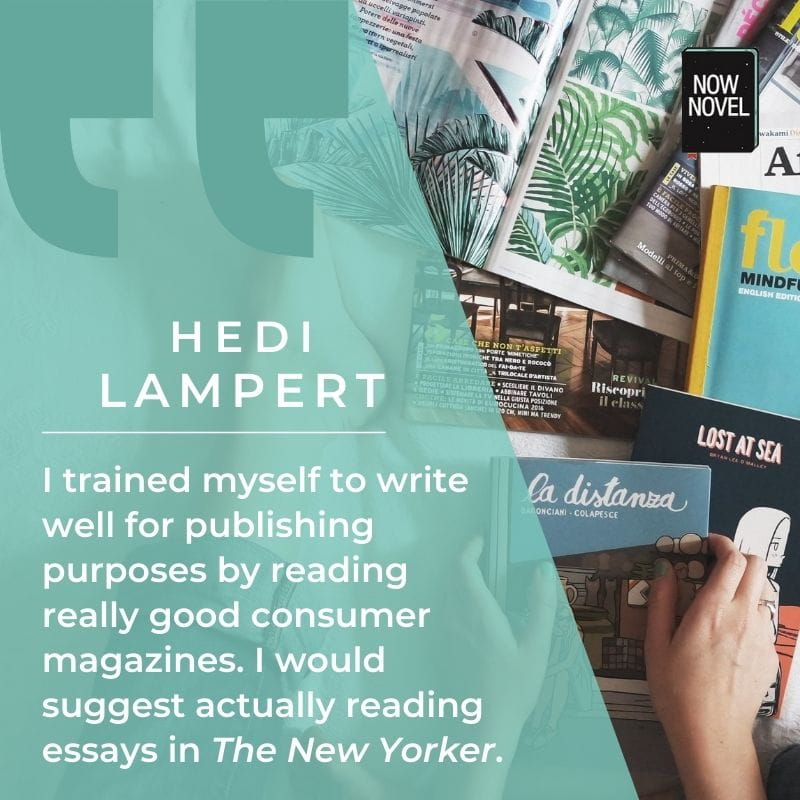We chat to Now Novel writing mentor Hedi Lampert about writing creative memoir based on family history, the challenges of juggling multiple creative interests and vocations, and more.
Lascelles Marais 00:00
Hello everyone and welcome! My name is Lascelles Marais from Now Novel and today I’m going to be interviewing one of our very own coaches, Hedi Lampert.
Hedi is a published author and does multiple other things such as voiceover work, public speaking, and copyediting. I hope you enjoy getting to know her today.
Hi Hedi, thank you so much for being with me today.
Hedi Lampert 00:19
That’s a pleasure, thanks for taking the time to chat.
Lascelles Marais 00:22
I’m so grateful that you’re here today. When I went on your website … you’re extremely accomplished, you have so many things that you do, but I wanted to ask specifically what is your role at Now Novel?
On being a writing mentor
Hedi Lampert 00:36
At Now Novel I’m a coach, and I facilitate my sessions to suit each writer and their particular needs, in terms of whatever they’re writing or trying to achieve.
Lascelles Marais 00:50
And what do you feel is the most rewarding aspect of coaching for both up-and-coming and experienced writers?
Why helping other writers is rewarding and fun
Hedi Lampert 00:58
There are numerous penny-dropping moments where a student will say, ‘Oh, that’s made things so much clearer!’ You know, often when you’re deep in that writing process you can’t see the wood for the trees and you often need an external person to come in and say, ‘Well hang on, perhaps you should move this there, or maybe we can look at this as a focal point, have you thought of that’.
There are numerous times when a student will say, ‘That has helped so much’, and for me nothing is more rewarding. But it’s also fun to brainstorm.
I get involved with all the plots and we brainstorm, and suddenly ideas come (and I don’t know where they come from) but it certainly inspires me because it triggers so much creativity in me, and I really love that.
Writing stories based on true events
Lascelles Marais 01:54
And your novel The Trouble with My Aunt is based on real events. Could you elaborate on what the story is about, and what inspired you to write it?
Hedi Lampert 02:02
It was … a wonderful experience, in that first of all, it took me about fifteen years to finally get my act together. So when my students say to me, ‘Ah but you know, I need to get it done by this time, and …’ You know, they’ve just given me the first draft. It takes a long time.
I’m not saying I sat and wrote for fifteen years, but it was a process over fifteen years of writing bits, not writing, working, being a mother, and it was only really in 2019 that I … or was it 2017? Anyway, I gave myself two months off work, freelancing, whatever, and I just said, ‘I’m going to write this book now’ and I finally sat down and actually wrote it.
Those two months were amazing because I was just dedicated. I’d get up in the morning, I’d go and do some dancing, come back, make french toast, sit upstairs with my blanket and my dog who’s there [tilts camera to show dog] – she was my companion – and just write all day. It was really wonderful.
Lascelles Marais 05:01
What would your three main tips be for writers who are wishing to write stories based on their own lives and experiences?
Tips for writers on creative life-writing
Hedi Lampert 05:10
Well I think that is honestly one of the most wonderful things to be able to do. If you have a story to tell, to be able to actually delve into what is authentic and express it with your own voice is, first of all, the most wonderful thing you could do.
However that doesn’t come without a certain amount of fear, because most of the time people will say, ‘But what about … the people who I’m writing about? Won’t people be insulted? Won’t people be upset? How am I going to get around that? How do I say what I need to say?’
Well I can’t give you the answer to that, because pretty much everybody who I wrote about had died. And that did… I’m sorry, but that made it a lot easier. So there is always that, but we work through that in the coaching process.
So the answer to your question is, ‘Be brave’. Really, like, run with the wild dogs and just go for it and see what happens. Tell your story. Because, you know… I once saw a cartoon that was about a writer. He was visiting a doctor’s office. He said, ‘If this book doesn’t come out on paper it’s going to have to be surgically removed.’
So, you know, sometimes you really have to tell a story. Tell it, just tell it.
Writing your own story vs co-authoring
Lascelles Marais 06:42
The book that you co-authored with [Greef Christie’s] property CEO Mike Greef, With My Head Held High, is another story of real-life experiences.
Could you again elaborate on the story, and how the co-authoring process differs from being a solo author?
Hedi Lampert 06:59
The story is about Mike’s struggle with ADD growing up, and how he found ways to get around it which involved always getting help from friends. So literally, from Grade 1, he’d make sure he was sitting next to the brightest kid in the class, and he would … he got through school kind of like that.
To this day, his greatest strength is that he knows how to employ the right people. And that has been the success of his business. In fact, I still work with him like ten, fifteen years later. I edit his property magazine, and I did a lot of their writing for many years, for the real estate company.
Working with him was, I suppose, easier for me because I would say to him, ‘Okay, tell me your story’, and then he’d just give me a bit of vague stuff. It was actually about knowing how to ask the right questions to draw stuff out of him.
People who don’t write and who are not used to describing or observing really need someone to interview them and bring it out.
So I had years of experience in terms of interviewing because I’ve worked in magazine journalism for decades. And I used those skills to bring stuff out of him, and then I kind of imagined that I was this little school child and how it would be walking past or running past the school toilets after break, and that dreadful smell from that weird disinfectant pink soap, and the sound of school shoes on the corridor floors.
So I just wrote the way I would feel, and I actually said to him, ‘Okay, so would you say this was your experience?’ in terms of that. And he’s like, ‘Oh my God, that’s absolutely it, how did you know?’
So it was just kind of, being observant and putting myself in there. I’m not saying that I made up his experiences, he told me his experiences, and I put them into a very readable form.
The book was very short. Because of his ADD He was too impatient and he wanted it published immediately, so it’s a very thin little book that you can read in virtually an afternoon. So ja, it was fun, it was also fun, but certainly writing my own story was a lot more satisfying.
Writing while also enjoying other vocations
Lascelles Marais 09:23
And did you always feel like you wanted to be a novelist, because you are someone who does many, many other things … did you always feel like, ‘Along with my many other skills, I want to publish a novel?’
Hedi Lampert 09:37
Yes. I got my first writing prize when I was eight. It was an essay about my mom. Weirdly enough, this book is very much about my mother and dedicated to her. And I said, ‘I’m going to get this book published – I’m going to finish this book in my fifties’, and so that’s what I did.
I was asked the question, ‘Why do you write?’ and I said, ‘Because it’s my destiny’. Writing is one of my loves, it’s something I… I probably define myself as a writer, but as you say I also do many other things.
Lascelles Marais 10:23
Not only are you a published author, but you pursue photography, voiceover work, copywriting, and many more things. And from your experience, what are three tips or just a few tips that you can give other multi-talented writers who wish to pursue multiple vocations?
Hedi Lampert 10:39
Okay, so if you want to do lots of things you need to have your head on straight. You need to make lists, and you need to keep a diary because otherwise you’re not going to get it done.
If you are going to do everything at once, then don’t feel bad about it. Don’t let people say, ‘Well wouldn’t it be better if you focused on one thing?’
Well of course it would be better if you focused on one thing, but that’s not the way you are. You’ve got lots of different facets, like a diamond you’re going to shine in all sorts of different lights. Go for it, do it, your life will be richer for it, and I do believe your writing will be richer for it.
The third thing would be, ‘Embrace deadlines’. Because when you’re that busy, the only way you’re going to get things done is with structure and deadlines. I just think deadlines galvanize us to glory, so don’t be scared of them.
Lascelles Marais 11:39
OK so your three tips would be, make sure that you’re organized, make those lists; embrace those multiple things that you’re good at, and then also embrace deadlines to keep you focused.
Hedi Lampert 11:52
Absolutely.
Conquering self-doubt through reading
Lascelles Marais 11:53
Amazing. And what would your advice be to a new writer who struggles with self-doubt?
Hedi Lampert 12:00
Read. Read and read and read and read.
The more you read, the better your writing becomes, the less you’re going to doubt yourself. You’re doubting yourself because somehow you feel your writing’s not good enough.
You’ll know your writing’s good when you actually are putting things down that when you read, they don’t make you cringe.
Obviously other people are going to have different opinions. I think that if you’re not … you don’t always have to do long reading.
You know, I trained myself … Okay, I was always into writing and English at school was a very good subject for me and I loved reading from the minute I could read. But I trained myself to write well for publishing purposes by reading really good consumer magazines.
I would suggest actually reading essays in The New Yorker, and other really revered current publications.
Look at the kind of work that is being published there. Those are the kind of standards that I would advise the young writer to strive for.
Not stuff that you’re finding online that is just somebody’s blog (I’m not saying there aren’t good blogs but a lot of stuff is very bad). And SEO writing (and I know this because I’m also an SEO writer) … and it’s my worst because the grammar is so bad. You have to start sentences with ‘and’, you start have to start sentences because Google requires a whole bunch of things for you to actually get good rankings – but it’s not good writing.
So go for stuff that is highbrow and read and read and read.
Hedi’s current and future releases
Lascelles Marais 13:51
Lastly I just wanted to ask, will you be releasing any new work in future?
Hedi Lampert 13:57
I would love to, but I still need to give The Trouble with My Aunt legs.
It was published just before lockdown, literally February/March 2020, and all my book launches had to be cancelled, all my literary festival appearances because all those festivals were cancelled. So it was frustrating and heartbreaking.
I’ve done some online sales, there have been some book shop sales following interviews on radio and in the press.
Whoever has read it, I’ve received amazing reviews and lots of five star reviews on Goodreads.com, but I’m nowhere any kind of point that I want to be in terms of book sales.
So I still have so much energy to give this particular child, and get it out into the world before I can even think of something else. When I’m teaching and coaching, I often think, ‘Ah I wish I was writing again.’ But I’m not ready to, but hopefully one day there will be another book.
Lascelles Marais 15:05
That makes a lot of sense. I’m so sorry to hear about everything now that’s happened with COVID.
Hedi Lampert 15:10
Yeah. But you know, it gave us different opportunities. And that’s the way we have to look at it.
Lascelles Marais 15:20
Thank you so much for taking the time to be here with me today. And thank you so much, I feel like everyone is going to feel like they know you just a little bit more. And I’m looking forward to seeing new work, but also I actually really want to purchase your book.
Hedi Lampert 15:35
Oh please do. I think you’ll enjoy it, it’s got a lot of things to relate to in terms of South African stuff, but also in terms of … ja, it’s a fun read I think, and it’s got interesting genetic stuff too.
Lascelles Marais 15:55
Amazing. Thank you so much.
Hedi Lampert 15:55
Thank you.
About Hedi Lampert
Hedi Lampert is a Mondi Award-winning writer and editor, with extensive publishing experience, an accomplished food stylist and photographer, with a vast portfolio of published work, and an up-and-coming voice artist with a background in radio broadcasting.
Hedi Lampert won her first writing prize at the age of eight, for an essay she wrote about her mother. Since then she has received numerous writing prizes including a Mondi Award for excellence in journalism.
*
Looking for a writing mentor to help you tell your story? Connect with a writing coach who has the experience and insight to help you get to the end.




